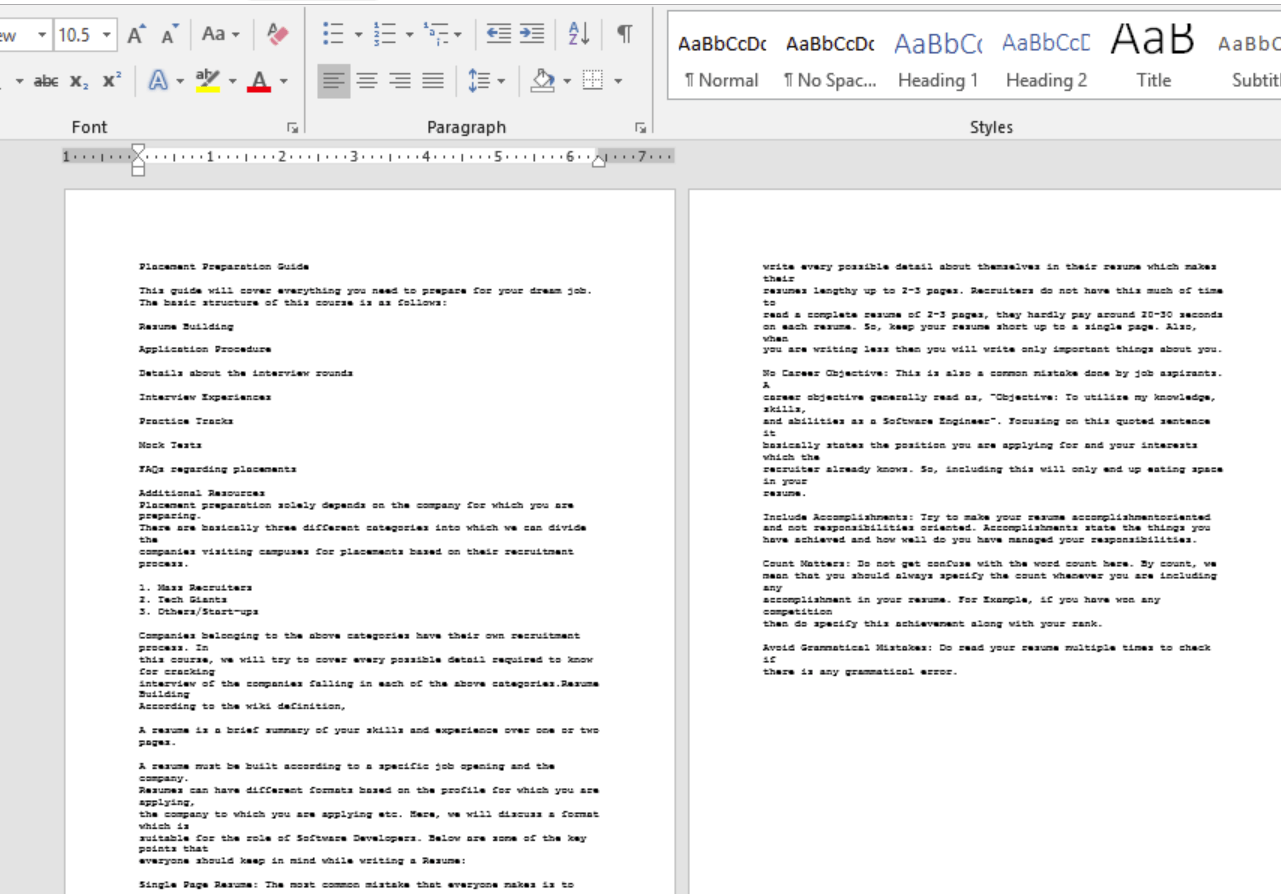如何使用OCR(光学字符识别)在Python中读取PDF内容
Python是当今世界上最受欢迎的编程语言之一。我们可以用它来分析数据,但数据并不总是以所需的格式提供。在这种情况下,我们可以将文件格式从pdf或jpg转换为文本(.txt)格式,以便更好地分析数据。有许多可用于执行此类任务的库。
我们可以使用Python的PyPDF2模块来执行将.pdf文件转换为文本格式的任务。使用此模块时可能会遇到的主要缺点是编码方案。PDF文档文件可以包含多种编码,如Unicode,ASCII,UTF-8等等。因此,将PDF文件转换为文本可能会导致数据丢失,因为编码方案不一致。
在本教程中,我们将学习如何使用“光学字符识别”方法读取PDF文件的内容,并将其保存在文本(.txt)格式文件中。
首先,我们需要将PDF文档文件的页面转换为图像,然后再使用OCR从图像中读取内容并将其保存在文本(.txt)格式文件中。
所需模块
我们必须使用以下命令安装本教程所需的模块:
- PIL: –
!pip3 install PIL
- pytesseract: –
!pip3 install pytesseract
- pdf2image: –
!pip3 install pdf2image
- tesseract-ocr: –
!pip3 install tesseract-ocr
(对于此问题,用户应该拥有Microsoft Visual C++ 14.0,可通过”Visual Studio生成工具”获取。 https://visualstudio.microsoft.com/downloads/ )
第1部分:
第一部分将处理将我的PDF页面转换为图像文件。PDF文件的每一页将存储为一个图像文件,图像的名称将存储为:
PDF page no. 1: page_no_1.jpg
PDF page no. 2: page_no_2.jpg
PDF page no. 3: page_no_3.jpg
PDF page no. 4: page_no_4.jpg
.
.
PDF page no. n: page_no_n.jpg
第2部分:
第二部分将处理识别图像文件中的文本,并将其分类到以“.txt”格式的文本文件中。在这里,我们将处理图像文件,将其转换为文本内容。一旦我们有了作为字符串变量的文本,我们就可以开始处理文本(.txt)文件。例如,在许多PDF文件中,我们可以看到当一行完成时,但最后一个单词无法完整写在同一行中时,会在末尾添加一个连字符,并将该单词延续到下一行。例如:
This is an example to show the above explanation of the wo-
rd which cannot be written entirely in the same line and is conti-
nued in the next line.
对于这样的单词,我们将进行基本的预处理,将连字符和后面的行转换为完整的单词。当我们完成预处理后,这个文本将被排序在一个单独的文本文件中。
代码
from PIL import Image as img
import pytesseract as PT
import sys
from pdf2image import convert_from_path as CFP
import os
# Importing the pdf file
PDF_file_1 = "exp.pdf"
pages_1 = CFP(PDF_file1, 9)
# Now, we will create a counter for storing images of each page of PDF to image
image_counter1 = 1
# Iterating through all the pages of the pdf file stored above
for page in pages_1:
# We will Declare the filename for each page of PDF file as JPG file
# For each page, the filename will be:
# PDF page no. 1: Page_no_1.jpg
# PDF page no.2: Page_no_2.jpg
# PDF page no. 3: Page_no_3.jpg
# PDF page no. 4: Page_no_4.jpg
# .... and so on..
# PDF page n: page_n.jpg
filename1 = "Page_no_" + str(image_counter) + " .jpg"
# Now, we will save the image of the page in system
page.save(filename1, 'JPEG')
# Then, we will increase the counter for updating filenames
image_counter1 = image_counter1 + 1
'''
Part #2 - Recognize the text content from the image files by using OCR
'''
# Variable for getting the count of the total number of pages
filelimit1 = image_counter1 - 1
# then, we will create a text file for writing the output
out_file1 = "output_text.txt"
# Now, we will open the output file in append mode so that all contents of the # images will be added in the same output file.
f_1 = open(out_file1, "a")
# Iterating from 1 to total number of pages
for K in range(1, filelimit1 + 1):
# Now, we will set filename for recognizing text from images
# Again, these files will be:
# Page_no_1.jpg
# Page_no_2.jpg
# Page_no_3.jpg
# ....
# page_no_n.jpg
filename1 = "Page_no_" + str(K) + " .jpg"
# Here, we will write a code for recognizing the text as a string variable in an image file by using the pytesserct module
text1 = str(((PT.image_to_string (Image.open (filename1)))))
# : The recognized text will be stored in variable text
# : Any string variable processing may be applied to text content
# : Here, basic formatting will be done:-
text1 = text1.replace('-\n', '')
# At last, we will write the processed text into the file.
f_1.write(text1)
# Closing the file after writing all the text content.
f_1.close()
输出:
输入PDF文件:

输出文本文件:

正如我们所看到的,PDF文件的页面已经被转换成图像。然后这些图像被读取,其内容被写入文本文件中。
使用OCR方法的优点
- 用户可以避免基于文本的转换,这可能会导致由于编码方案的原因造成数据损失。
- OCR模块还可以识别PDF文件中的手写内容。
- 用户还可以通过使用OCR模块仅修改识别PDF的特定页面。
- 由于获取到的文本是可变的形式,可以进行大量的预处理。
使用OCR方法的缺点
- 在本地系统中使用磁盘存储图像文件。然而,这些文件只占用很少的空间。
- 使用OCR并不能保证100%的准确性。而在计算机上创建的PDF文件文档具有非常高的准确性。
- OCR模块可以识别手写内容,但准确性取决于许多因素,如页面的颜色、手写清晰程度等。
结论
在本教程中,我们讨论了如何使用Python中的OCR读取PDF文件内容。
 极客笔记
极客笔记